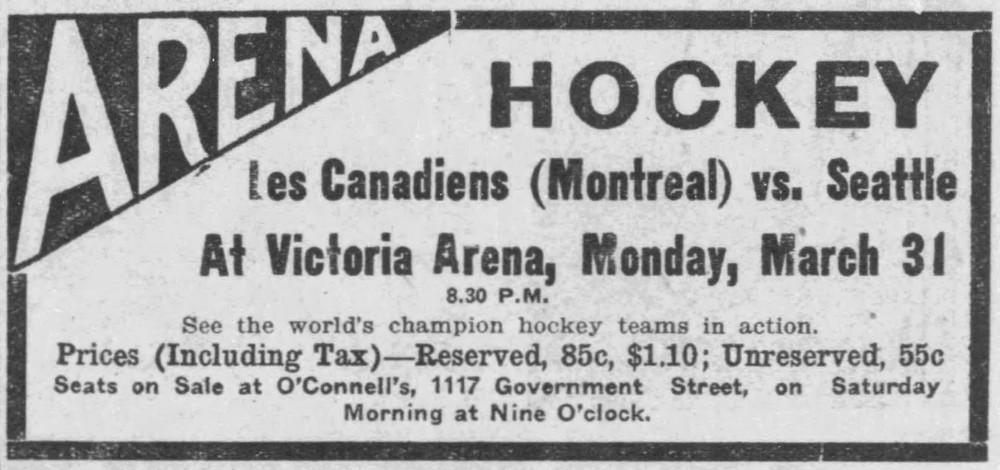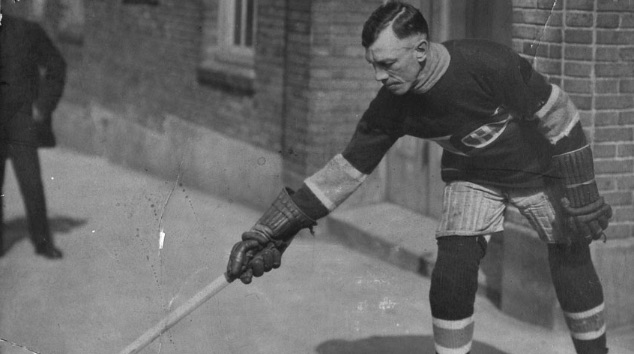The Stanley Cup series was tied with only a final game left to determine hockey’s champion. That game would never be played.
The Montreal Canadiens, having travelled by train across Canada before taking a rest and playing an exhibition game in Vancouver, were in Seattle to play the Metropolitans to determine hockey supremacy.
Two overtime games physically taxed players on both teams, some of whom were reporting fevers and other symptoms of influenza. One nearly fainted. Joe Hall, a Montreal defenceman, only lasted 10 minutes in the previous game before retiring with sickness.
On the morning of what would have been the deciding game, it was announced the series was suspended. Five Canadiens, as well as their manager, were sick with the Spanish flu. Several Seattle players, as well as family members, were also ailing.
In Victoria, B.C., Lester Patrick got a long-distance telephone call, at the time still so rare as to rate a mention in the newspapers, informing him of the ailing players. A future exhibition game between the Mets and the Flying Frenchmen in the British Columbia capital was also cancelled. Tickets, costing from 55 cents to $1.10, were refunded.
“It will be two or three weeks before the visiting boys will be back on their feet and able to play,” the management of the Seattle arena announced; “consequently, the world’s series has been called off with two games to the credit of each team.”
The news soon got much worse.
Even as the players recovered one by one, the oldest of them, Hall, 37, continued to deteriorate, developing pneumonia. His widowed mother, who lived in Vancouver’s West End, rushed to his sickbed at Columbia Sanitarium, a hospital in Seattle run by the Missionary Sisters of the Sacred Heart. His wife and their three children left Brandon, Man., by train. Along the way, they received a telegram stating Joseph Henry Hall had died at 3 p.m. on April 5, 1919.
One hundred years ago today, on April 8, the surviving Canadiens gathered in a Vancouver funeral parlour to bid adieu to a teammate. The Center and Hanna undertaking rooms at 1049 Georgia St., just west of Burrard, were filled to overflowing with floral tributes and wreaths of daffodils and lilies.
A minister spoke briefly about Hall’s contribution to the sport of hockey. Among the mourners were the defenceman’s mother; his younger brother, Bert Hall; his widow, the former Mary Isabel Clare Alexander; and her parents, Mary McIntosh (née Fisher) and William Molson Alexander, a constable for the Canadian Pacific Railway in Vancouver.
Many athletes and sportsmen from the city were in attendance, including Frank Patrick, owner of the Vancouver arena. The pallbearers included his brother Lester Patrick, manager of the Victoria Aristocrats; star players Si Griffis and Fred (Cyclone) Taylor of the Vancouver Millionaires, and Newsy Lalonde, Bert (Pig Iron) Corbeau and Louis Berlinguette (sometimes rendered as Berlinquette) of the Canadiens. Only the latter pair has not been enshrined in the Hockey Hall of Fame, as was the man whose remains they carried on their shoulders, who was inducted in 1961.
The body was then taken to Mountain View Cemetery, likely by motorized hearse, as George Center and John Hanna were the city’s first undertakers to replace the horse and wagon.
Most everyone in hockey hated tough guy Bad Joe Hall, until he died.
“Joe had a heart as big as a house,” Lester Patrick said, “and was a prince of good fellows.”
“Joe was popular with everybody,” Lalonde insisted, “and they are certainly all feeling badly over his death.”
“Years ago Joe Hall was styled ‘Bad’ Joe Hall, but this was uncalled for,” wrote Calgary sportswriter Harry Scott. “Hall has played some rough hockey in his day, but only after another player started it. He took his bumps and handed them out after being provoked.”
A different story was told before his untimely death. Even in his mid-thirties, Hall led the fledgling NHL in penalties in the league’s first two campaigns, with 100 minutes in 21 games in 1917-18 and a shocking 135 minutes in just 16 games in what would be his final season. By then, his reputation was such that no referee ever gave him the benefit of the doubt. Officials saw him as an unrepentant scofflaw.
Hall had a legendary rap sheet. Born in Staffordshire, England, in 1881, he immigrated to Winnipeg with his family as an infant. A lean but muscular battler at five-foot-10, 175 pounds, he played hockey like rugby and wielded his stick like a cavalryman waving a sword. He was banned from the Manitoba senior league before he was old enough to vote.
In 1905, he signed with the Portage Lakes team based in Houghton, Mich., in the new International Professional Hockey League. (Cyclone Taylor was a teammate.) His 98 penalty minutes in just 20 games led the league, though he also found time to score 33 goals, best on the team.
Like other early stars, he was a mercenary, playing wherever he could earn the highest salary, lacing up for such clubs as the Brandon Wheat Cities, Montreal Shamrocks, and Montreal Wanderers before settling in for a long run with the Quebec Bulldogs with whom he won Stanley Cup championships in 1912 and 1913.
Along the way, he spilled his share of blood, some of it his own, and placed his name on the police blotter. On Jan. 22, 1910, Hall, playing for the Shamrocks, got into a legendary fight with Frank Patrick of the Renfrew (Ont.) Creamery Kings, suffering cuts over both eyes, which blinded him during their pugilistic endeavors.
For his shenanigans, the league fined Hall $100 and suspended him for a week.
Three years later, he assaulted a referee and was fined $50 by the league. His own employer was so upset by his behaviour that they fined him $100.
In a 1913 game, Newsy Lalonde, his great rival, cut Hall in the head with his stick for eight stitches. Two weeks later, Hall claimed his revenge, crunching Lalonde into the boards. He needed 10 stitches to close his cut.
In a game in Quebec City in 1917, Hall attacked two Toronto players, sparking a riot by fans who pelted the visitors with chairs and bottles. Police were unable to restore order and the game was suspended with two minutes left to play. The Toronto players were attacked by a mob on the way to the train station with several players beaten.
A vicious stick-swinging duel with Alf Skinner of the Toronto Arenas led Toronto police to arrest the pair, who were charged with disorderly conduct. A judge fined each $15.
Hall joined the Canadiens after the Bulldogs suspended operations during the Great War. In his second season with his former archrivals, the team defeated Ottawa to win the league title. They then travelled west by train to meet the champion of the Pacific Coast Hockey Association, with the winner to claim the Stanley Cup. The Canadiens played exhibition games along the way in Regina, Calgary and Vancouver, while Seattle defeated Vancouver to claim the coast title.
A best-of-five championship series was set for the Seattle Arena. Bettors placed even-odds for the showdown, even though Seattle star Bernie Morris, who, like Hall, was from Brandon, was being held at a guardhouse at Camp Lewis under court martial on a charge of desertion from the U.S. Army.
Those odds changed after the Metropolitans cruised to a decisive 7-0 victory in the opening game, which was played under Western rules, with seven players on a side (the extra position was known as a rover, playing ahead of the defenceman and behind the forwards), a larger neutral centre-ice zone, and different penalty rules. The second game, played with six-a-side Eastern rules, was won 4-2 by the Canadiens. The Metropolitans won the third game, by 7-2, to move within a victory of the Cup.
The fourth game remains a hockey legend. The teams battled under Eastern rules for 60 scoreless minutes, and then for another 10 scoreless minutes of overtime. A second 10-minute overtime period was also scoreless. The two goalies, Hap Holmes of the Mets and Georges Vezina of the Canadiens, known as the Chicoutimi Cucumber, refused to crack. Seattle only needed a goal to claim the Cup, but after a lengthy argument, the game was declared a draw.
The teams met again three days later, after lengthy arguments over which rules should prevail, considering the previous match under Eastern rules had no victor. In the end, the game was played under Western rules. Seattle held a 3-0 lead after two periods. Players began to show the effects both of the strenuous series and of influenza. Hall retired after collapsing to the ice in the first period. The desperate Canadiens clawed back, Lalonde scoring a tying goal with less than three minutes left to play the “best and fastest exhibitions of hockey ever seen here,” the Victoria Daily Times reported. The game went into overtime with Seattle again needing just a goal to claim the Cup. After more than 15 minutes, Jack McDonald scored his first goal in weeks to keep the Canadiens alive. The series was tied at 2-2-1.
Five of the Canadiens and manager George Kennedy were bedridden. Montreal newspapers reported the entire team was on its deathbed. Several ran fevers over 100 with Hall topping the list at a dangerous 104. The Spanish flu was a terrible scourge, killing millions as it spanned the globe in the aftermath of the Great War. Some 300 people in Seattle succumbed to the disease in January. It was an odd and disconcerting pandemic. Adults who had been healthy in the morning were dead by nightfall. All except Hall recovered within a week. (Kennedy, who owned the Canadiens, never fully regained his health and died two years later.)

The death left the former Clare Alexander, a Brandon schoolteacher who married Hall in 1907, a widow at age 36. She had only modest savings from her husband’s income as a professional athlete and as a summertime cigar traveller, a salesman who plugged tobacco wares across the Prairies.
To support the widow, exhibition hockey games were played in Brandon, Winnipeg and Moose Jaw, Sask., in 1920, raising a disappointing $2,153.50 (less than $27,000 in 2019 dollars) for the family. The Patrick brothers kicked in an additional $500, while the National Hockey League contributed nothing. She got small interest payments every year for a decade until the fund was wiped out when the Canadian Guaranty Trust Co. of Brandon went insolvent in 1930, an early victim of the Depression.
She supported her family by teaching for more than three decades at General Wolfe Elementary, near Main and King Edward in Vancouver.
Sadly, she lived long enough to endure another family tragedy. A grandson, Joseph David Hall, who starred at soccer, track, baseball, basketball and football in high school and at the University of B.C., developed a spinal tumour that paralyzed him from the waist down. He then took up wheelchair sports only to die of cancer a year later at age 21.
Every season for more than a century, the presentation of the Stanley Cup has been a silver exclamation mark at the end of the hockey season. Only twice since Lord Stanley of Preston, the governor general, commissioned the cup for 50 guineas in 1892 has it not been awarded, once owing to a labour dispute and, a century ago this month, to a devastating illness and the sudden death of one of hockey’s first stars. ![]()
















Tyee Commenting Guidelines
Comments that violate guidelines risk being deleted, and violations may result in a temporary or permanent user ban. Maintain the spirit of good conversation to stay in the discussion.
*Please note The Tyee is not a forum for spreading misinformation about COVID-19, denying its existence or minimizing its risk to public health.
Do:
Do not: